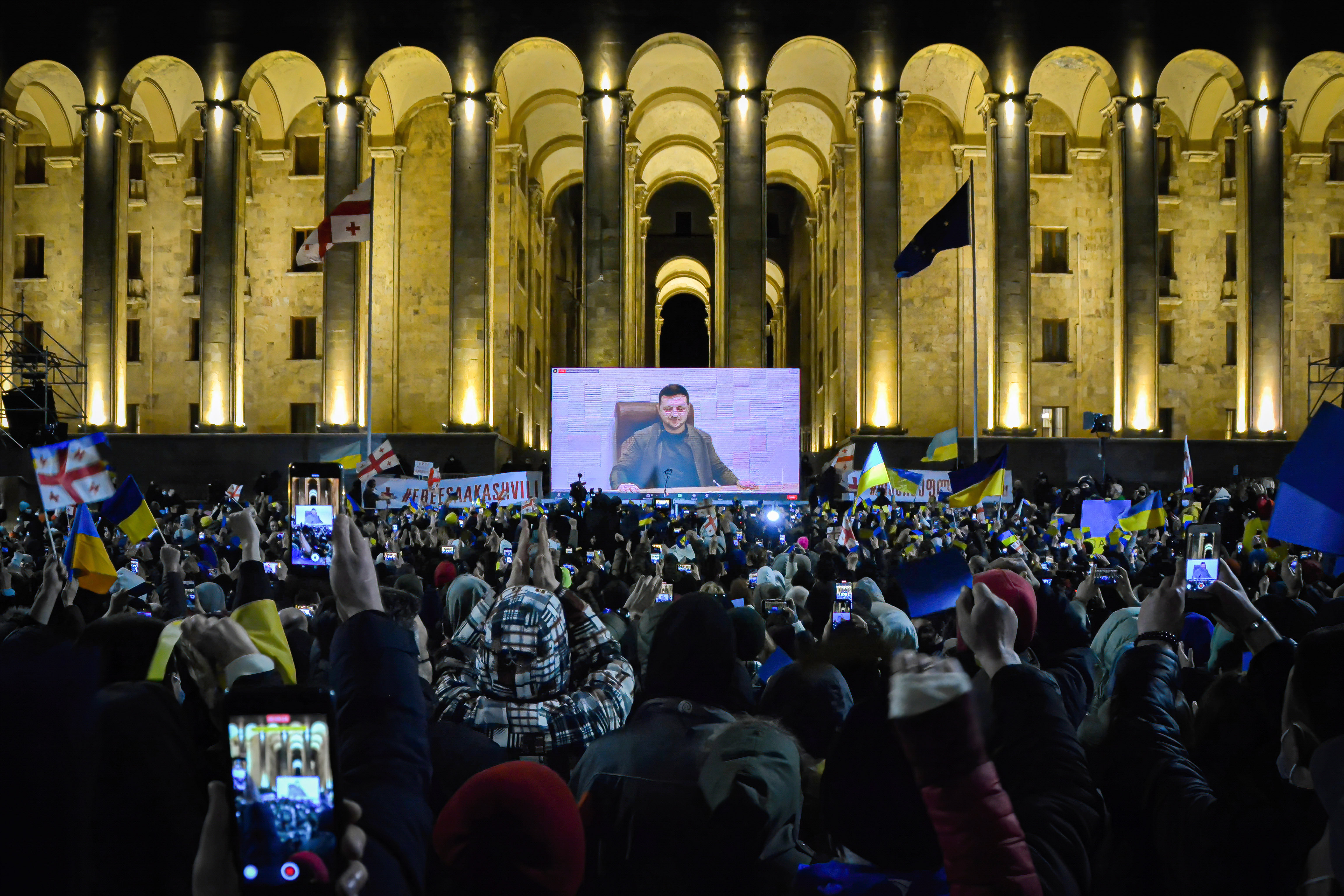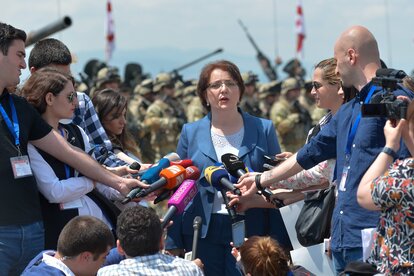War in Europe
Is Georgia Russia's next target?

picture alliance / ZUMAPRESS.com | Nicolo Vincenzo Malvestuto
The Russian invasion of Ukraine is also awakening new fears and concerns in other former Soviet republics. Example: Georgia, where Russian soldiers had already invaded at Putin's command in 2008. Former Georgian Defense Minister Tinatin Khidasheli (2015 - 2016), who has been connected to the Friedrich Naumann Foundation for many years, analyzes the situation.
In the course of Russia's invasion of Ukraine on February 24, 2022, more and more politicians, experts and analysts are thinking back to the Russia-Georgia war of 2008 and the mistakes made by the democratic world community at that time, both before the war broke out and after the ceasefire agreement was concluded.
Anders Fogh Rasmussen, the former prime minister of Denmark who became NATO secretary general a year after the Russia-Georgia war, gave an interview a few days ago titled "Appeasement of dictators does not lead to peace, but to war." He remembers with a heavy heart the Bucharest summit in 2008 and in particular Putin's heated appearance at the NATO-Russia meeting, "If we had listened to him at the time, we would have taken him seriously then.... So I very much regret that we did not take him seriously then. The lesson we learned from that is: we should take him seriously. At the latest and at least now."
It is hard not to share the former NATO Secretary General's assessment when he likewise says, "We should be clear that we are faced with the choice of confronting Putin now or fighting him later, because Putin will not stop in Ukraine."
Today, the question very often arises whether Georgia will be Putin's next stop. Or even more precisely: who will be the next? Before considering the question of "who", we should think about the "what". "What" is coming next? Or "what" is the consequence of the Russian perfidy and agony that we observe and witness today on the Ukrainian territory? The analysis of these questions, as well as the search for answers, logically leads us to different scenarios.
In Georgia, Russia's mission is practically accomplished. The occupation of 20 percent of Georgia's territory was not only a political act for recognizing the independence of Abkhazia and South Ossetia, but the consequent fulfillment of two very important tasks: both ensuring the stationing of Russian military not far from the NATO border and obstructing Georgia's accession to NATO. Mission accomplished!
Today, there are three Russian military bases on the territory of Georgia, two of them in South Ossetia (in Tskhinvali and Java) and one on the Black Sea coast (in Gudauta - Abkhazia), where at least 15.000 military personnel are permanently stationed. The exact numbers are not published by Russia or the self-proclaimed republics, but if the pro-Russian media (Sputnik-Ossetia, Sputnik-Abkhazia) are to be trusted, the military units stationed in Abkhazia and South Ossetia have funds secured by the Russian Federation that enable them to conduct numerous military exercises. The doors of up to 20 Russian military schools are open to young recruits from Abkhazia and South Ossetia. The armed forces themselves are also equipped with modern military equipment and are always on standby.
In 2019, President Putin signed the "Modernization Plan for Abkhazian Armed Forces", on the basis of which significant financial resources were mobilized and Abkhazia's military equipment was significantly improved. It should not be forgotten that both Russian forces stationed in Abkhazia and South Ossetia belong to the Russian military district (okrug) "South" and are also attached to and subordinate to its staff. Therefore, it will be easy to provide necessary ammunition and equipment "if necessary".
Georgia has a well-trained army, tested and experienced in military operations and defense, excellently equipped and motivated. Not to be underestimated are the reservists, which include tens of thousands of soldiers tested in Iraq and Afghanistan. Furthermore, the regular training measures implemented within the framework of Georgia's cooperation with NATO, as well as with other strategic partners, serve to strengthen the military potential available and to increase its professionalism. No less significant are the decisions made in recent years by the U.S. and other NATO member states to lift restrictions on the purchase of ammunition for Georgia, making it easier for Georgia to acquire more modern weapons, of which use has been made.
The Russian military bases in South Ossetia, equipped with unlimited resources, are only 40 kilometers away from the Georgian capital Tbilisi and can receive any kind of support through the Roki tunnel within a few hours. They represent a serious challenge and great danger to the protection of the independence and sovereignty of the Georgian state. The same applies to the military base in Gudauta (Abkhazia). The expected danger of a new wave of direct Russian aggression is not particularly high at present. Nevertheless: there is definitely a connection between the outcome of the war in Ukraine and the future of the Georgian state.
A defeated Putin is not expected to attack Georgia. But should he decide to do so in his last breath, Georgia has a more realistic chance of pushing back a Russia that has been defeated in Ukraine.
If things turn out differently, Rasmussen is absolutely right when he says that the West must either defeat Russia in Ukraine now and today or enter the war itself. Because the power-hungry Putin will not stop after a victory in Ukraine. Georgia and Moldova are too small for him and his ambitions. These reach, as is also clear from the ultimatum sent by Putin in December, all the way to the Eastern European NATO member states.
For Vladimir Putin, failure in this war is predetermined. He will suffer defeat either today in Ukraine, if the West offers more active and radical help, or tomorrow on the territory of NATO. Where or at what cost the defeat will come is only in the hands of NATO and the allies of Ukraine and Georgia. It is time to take radical steps.

Tinatin Khidasheli ehemalige georgische Verteidigungsministerin bei einer Pressekonferrenz im Mai 2016 in Georgien
©picture alliance / NurPhoto | Artur Widak
